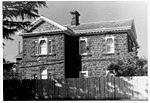Kew Cottages
1887 establishments in Australia2008 disestablishments in AustraliaDefunct hospitals in Victoria (Australia)History of Victoria (Australia)Hospital buildings completed in 1887 ... and 3 more
Hospitals established in 1887Psychiatric hospitals in AustraliaUse Australian English from March 2018

Medical terms in this article are in the context of what was legally correct usage for that period where they appear in the text. Therefore "feeble-minded", "idiot", "imbecile", "lunatic", etc., should not be taken at their modern significance.'Kew Cottages', Kew Children's Cottages and finally as Kew Residential Services is a decommissioned special development school and residential service located in Kew, an eastern suburb of Melbourne, Victoria, Australia.
Excerpt from the Wikipedia article Kew Cottages (License: CC BY-SA 3.0, Authors, Images).Kew Cottages
Linnaker Place, Melbourne Kew
Geographical coordinates (GPS) Address Nearby Places Show on map
Geographical coordinates (GPS)
| Latitude | Longitude |
|---|---|
| N -37.797408333333 ° | E 145.02665555556 ° |
Address
Linnaker Place
Linnaker Place
3101 Melbourne, Kew
Victoria, Australia
Open on Google Maps






